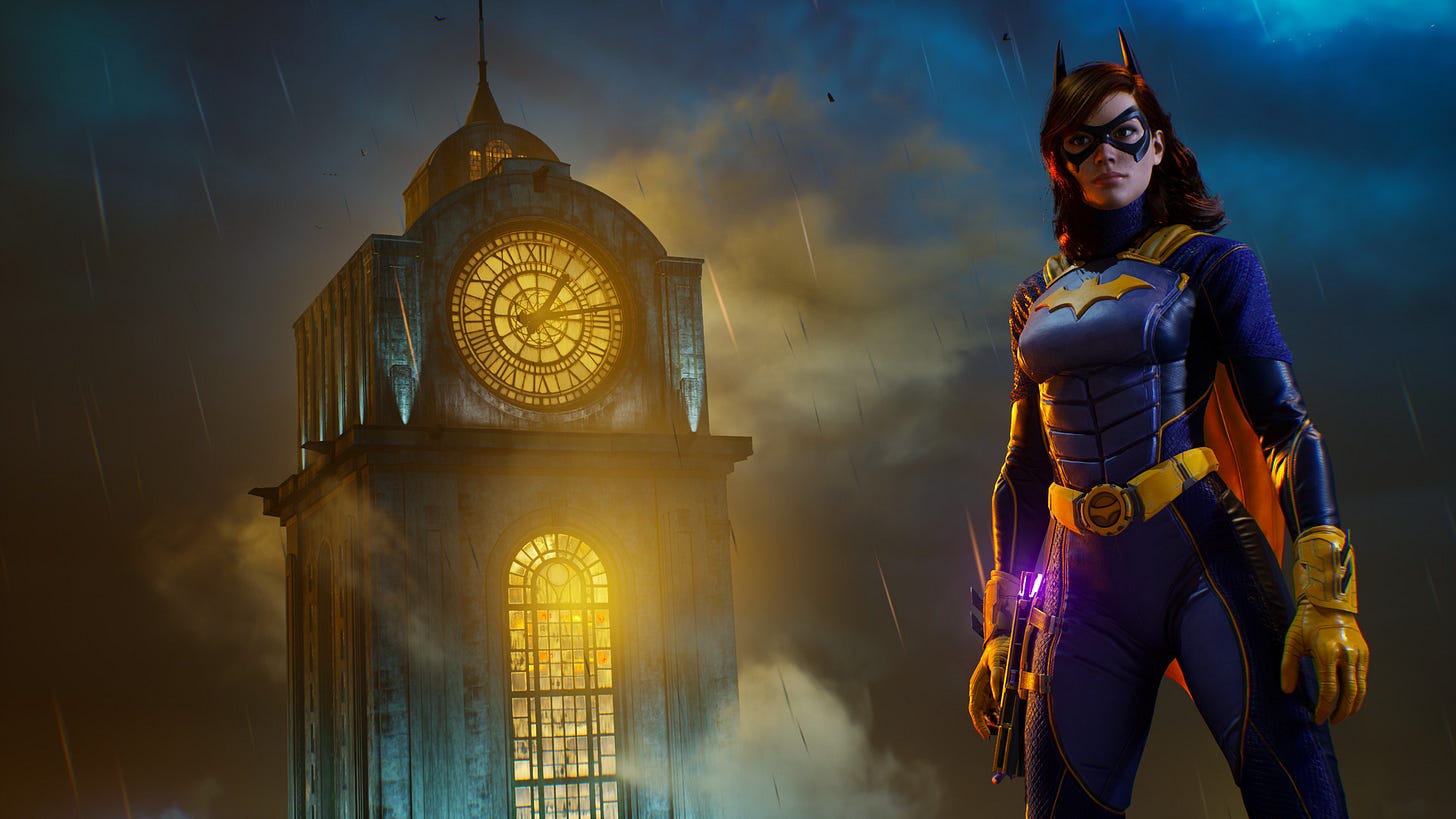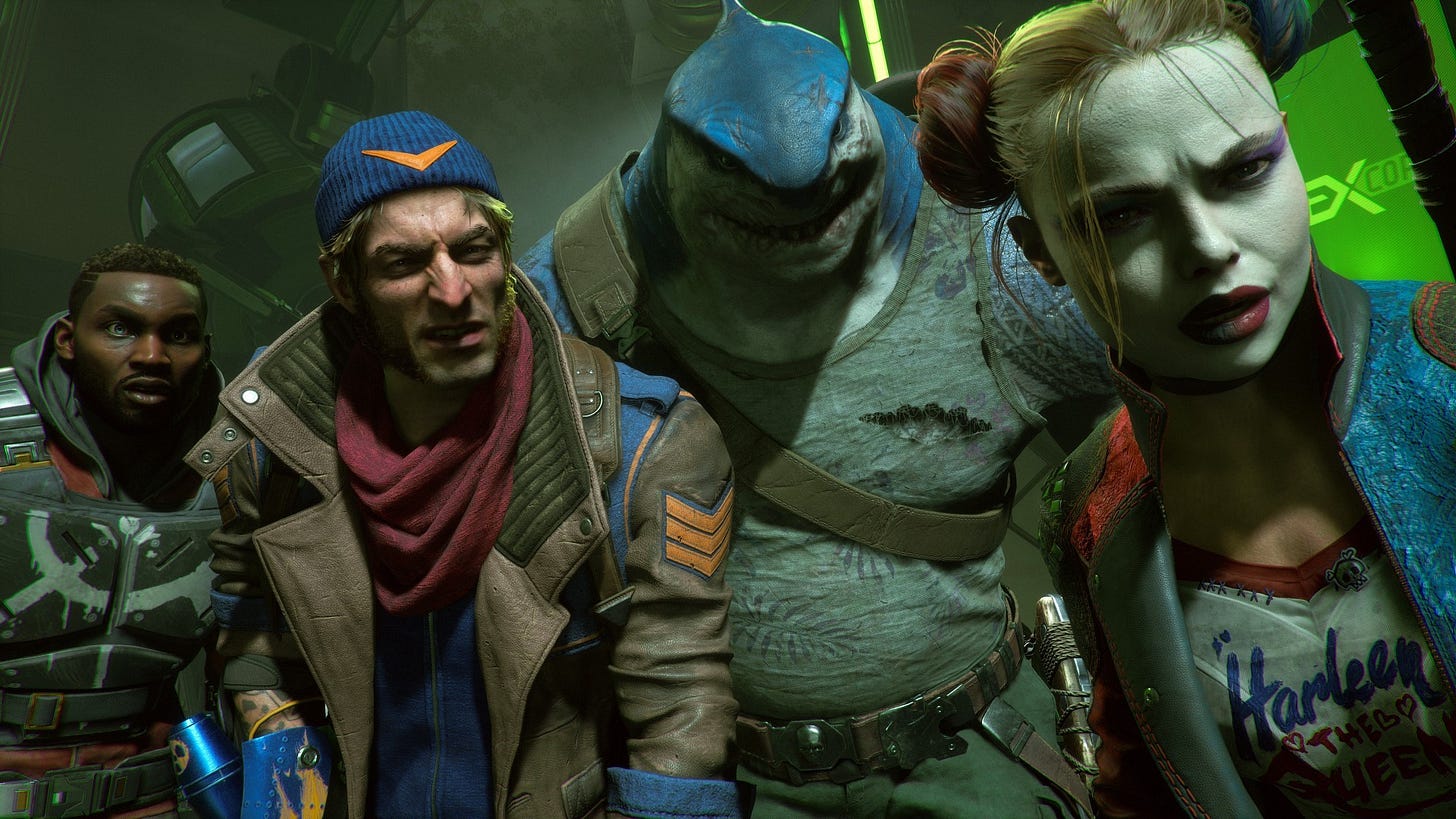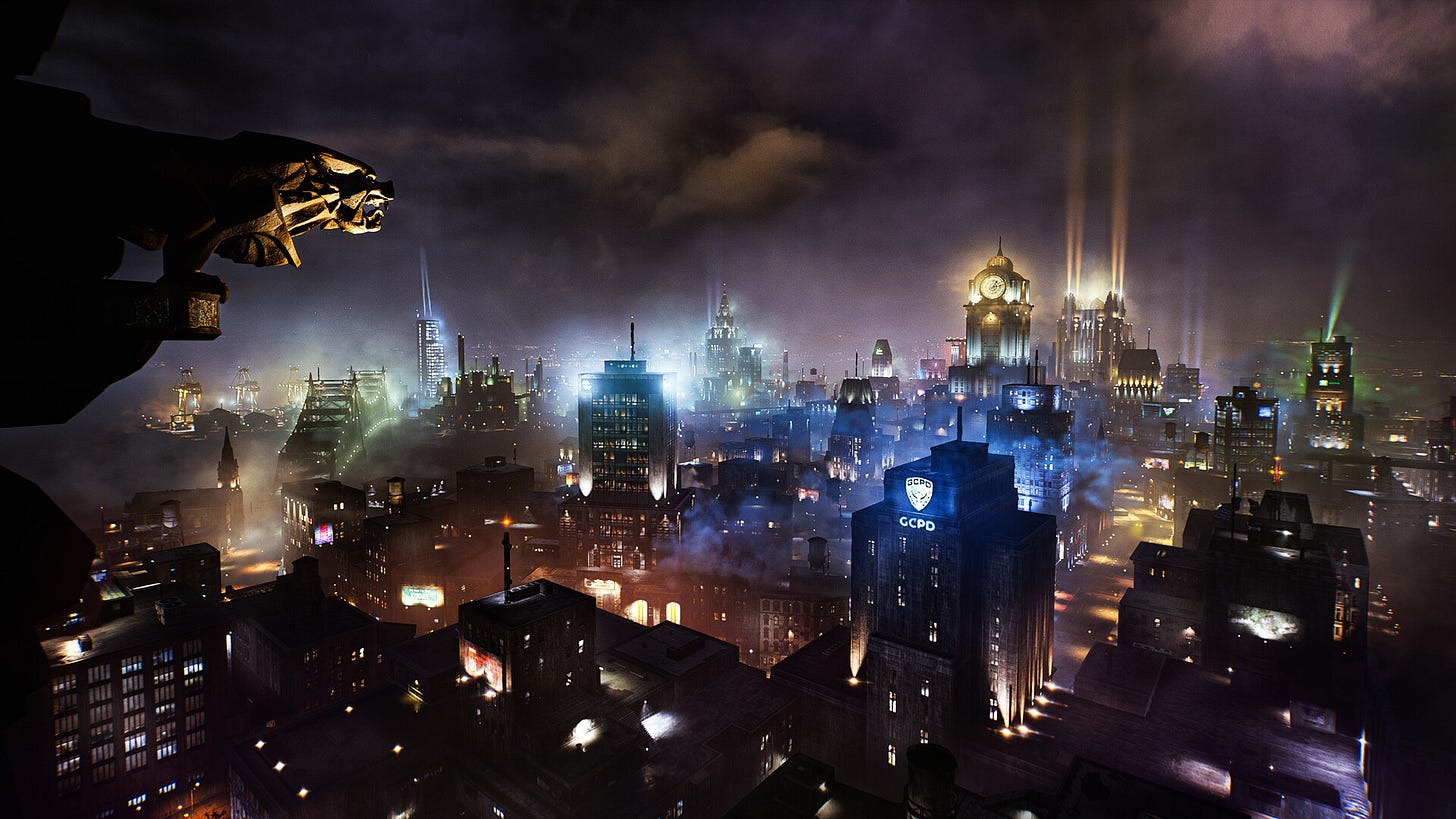What did Gotham Knights get right that Suicide Squad got wrong?
Will the Family ever get its due?
This week I am joined by GamesHub reporter Leah Williams. She is the kind of sharp and empathetic writer I wish I had the opportunity to work with more often, a relentless advocate for the Australian games scene and the maker of many a dazzling jacket. You can find more of her work here. You can also follow her via Twitter or BlueSky.
Fergus: Back in 2022, Warner Bros Games published a little game called Gotham Knights. A spin-off of Rocksteady’s critically acclaimed and commercially successful Batman Arkham series, the title allowed players to take up the mantle of various members of DC’s “Batfamily” and take on the infamous Court of Owls alongside up to four friends. With loot-driven progression, an ambitious take on open-world multiplayer and a storyline that centered a lot of the characters and lore that often ends up shoved into the margins.
Unfortunately, thanks to a combination of mixed reviews, poor sales and a launch beset by technical issues, Gotham Knights was hardly the hit that its developer, publisher or DC fans hoped it would be. Two years later, the launch of Rocksteady’s Suicide Squad: Kill The Justice League would repeat these same sins. Like Gotham Knights, Suicide Squad was a multiplayer-focused riff on the formula that Rocksteady had established in its Arkham games. However, it arrived at a moment when the wider sentiment around such “forever games” had turned a corner from the compelling into contempt.
Timing is often underrated when it comes to separating the hits from the hidden gems in gaming. That said, and given the spite to which Suicide Squad was subjected, it’s worth asking if it could have learned more from the multiplayer-centric Batman game that came out before it.
Leah: Gotham Knights should rightfully be considered the true heir to the Rocksteady Arkham throne, because it better embodied the tone and flavour of the Arkham series – even if Rocksteady insisted Suicide Squad: Kill the Justice League was a sequel for that universe. Nightwing, Batgirl, Robin, and Red Hood existed in a world that could feasibly be interpreted as a result of the events of the Arkham series, even if its villains differed slightly. It had the same grimy, neon visuals and style, and combat was just as satisfying as in the original Arkham games. More to the point, the writing was just as deft, with the relationship between the Batfamily being weaved well throughout missions. The main crew always felt like a real family, and the dialogue is frequently sharp and heartfelt, if not outright funny.
It’s wild to compare the game to Suicide Squad: Kill the Justice League, because they do have a lot in common. They both feature multiplayer squads of heroes battling through a city, and they both have a mission-based structure. But where Suicide Squad had a light-touch approach to its missions, only loosely tying them to story, it felt like Gotham Knights took a much more meaningful approach to its storytelling. Clever writing means you like the characters and you want to follow their journey, and the mission structure is directly tied into their relationships, and how they evolve.
Fergus: Despite the eye-catching tagline of going up against the Justice League that Suicide Squad has going for it, I do feel like the more straightforward narrative setup served Gotham Knights well in terms of picking up where Arkham Knight left off.
Even if the game technically takes place in a different continuity to the one established in the Arkham games, "Batman is dead, so what now?" is a fantastic narrative springboard in any universe. I reckon Gotham Knights also found a better balance between its main narrative threads, side missions and open-world activities. Even if the way that the in-game systems involved interlock was sometimes a little clunky, the core gameplay hook ("What if a Batman Arkham game had co-op?") is a natural extension of what those with an appetite for more Arkham are after and a compelling complement to the broader themes and character arc it plays with.
Given that Gotham Knights developer WB Games Montreal was also responsible for Batman: Arkham Origins, I'm curious if Gotham Knights will get more of a fair shake in the long run. Arkham Origins also received a mixed reception at launch but as time has passed, that's changed specifically because of its storytelling chops. My other thought when looking at the icy reception of both Suicide Squad and Gotham Knights is how the landscape for that specific corner of the gaming world is shifting.
In the long gap between Arkham Knight and Suicide Squad, Insomniac's Spider-Man games became the gold standard of modern AAA superhero games. However, leaks earlier this year revealed that Insomniac ultimately pulled back on its ambitions to pivot into multiplayer with the unannounced (and then-cancelled) Spider-Man: The Great Web. Where Warner Bros' vision of big-budget superhero games is one built on multiplayer, almost all of the AAA projects based on Marvel properties seem to be hedging on the exact opposite scenario.
Leah: I certainly think Gotham Knights will eventually get the re-evaluation it deserves, as more people come to recognise it for what it is.
At launch, I believe it suffered from misconceptions that people accepted as fact. With Suicide Squad on the horizon and both games sharing a similar enough premise, it was assumed that Gotham Knights was a live service game, for one thing. At the time, there was a groundswell of push-back against live service games, as players began to perceive them as cash grabs exploiting whale players. The conversations around Gotham Knights seemed to focus on this game and its live service features – but in reality, there were not. Regardless, social media has a way of picking up a narrative thread and sticking with it, and when these criticisms around Gotham Knights began, it appears folks who hadn’t even played the game continued the narrative.
In the coming years, I hope there’s a reflection about the nature of social media discourse when it comes to games. Lately, it’s been too easy for misinformation to spread, and for false narratives to become entrenched in the discourse. The voices of the few became the voice of the many with Gotham Knights, to the game’s detriment. Within months, it was discounted to 50%. Reasonably, I’d like to think that was because WB Games wanted more people to actually play the game and realise its merits – but it also speaks to an overall lack of popularity, driven by that early hearsay, and a few dour reviews. Of course, everyone’s entitled to their opinion, but I do think Gotham Knights was treated harshly based on misconceptions of gameplay, a rising push-back against live service, and the fact that it wasn’t actually an Arkham game.
Folks decided what the game was, and then never gave it a chance to be anything else.





